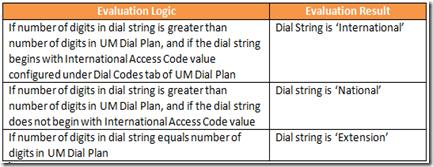Expected outdialing behavior for ‘Play on Phone’ scenarios in Microsoft Exchange Unified Messaging
The Microsoft Exchange Unified Messaging ‘Play on Phone’ feature provides access to voice mail messages for UM-enabled users. However, instead of playing the media attachment from a voice mail message over their computer speakers, users can listen to voice mail messages on a telephone handset.
When UM-enabled users work in office cubicles, use a public computer, have a computer that isn't enabled for multimedia, or have a voice message that's confidential, they may not want to or may be unable to play a voice message over their computer speakers. The Play on Phone feature lets UM-enabled users play the voice message over a telephone. The Play on Phone feature is available in Exchange 2007 Outlook Web Access, Exchange 2010 Outlook Web App, and in Microsoft Office Outlook 2007.
In Exchange 2007 Unified Messaging, the default behavior for processing ‘Play on Phone’ requests can be summarized as follows:
- Accept the request from CAS (which includes telephone dial string entered by user in Outlook/OWA)
- Check dial string to determine whether it is an extension, national number, or international number (e.g. 8005551212)
- Look up user information in Active Directory (extract ADUser, mailAddress, UMExtension, UMEnabled, etc.)
- Look up IP Gateway associated with UM Dial Plan that is enabled for outbound dialing
- Check whether dial string is permitted by validating against UM Mailbox Policy:If dial string is ‘International’, compare against International Dialing Restrictions from UM Mailbox Policy
If dial string is ‘National’, compare against In Country/Region Dialing Restrictions from UM Mailbox Policy
If dial string is ‘Extension’, compare against the ‘Allow calls to users/extensions…’ options from UM Mailbox Policy- If dial string is permitted, send to IP Gateway (e.g. 8005551212)
Although various dial code entries may be configured on the Dial Code tab of the user’s UM Dial Plan, the dial string is never manipulated. Rather, the format of the dial string remains constant throughout the entire ‘Play on Phone’ outdialing process. Please note that this behavior only applies to ‘Play on Phone’ calls which are placed by Exchange 2007 mailbox users.
In Exchange 2010 Unified Messaging, the default behavior for processing ‘Play on Phone’ requests has changed from that of Exchange 2007, and as such the default behavior can be summarized as follows:
- Accept the request from CAS (which includes telephone dial string entered by user in Outlook/OWA)
- Check dial string to determine whether it is an extension, national number, or international number (e.g. 8005551212)
- Look up user information in Active Directory (extract ADUser, mailAddress, UMExtension, UMEnabled, etc.)
- Look up IP Gateway associated with UM Dial Plan that is enabled for outbound dialing
- Get the National Number Prefix [1], Country or Region Code [1], and Outside Line Access Code [9] from the Dial Codes tab of UM Dial Plan
- Determine whether dial string should be manipulated to accommodate the configured Dial Codes from UM Dial Plan:If dial string is ‘International’ number, prefix with Outside Line Access Code and International Access Code (e.g. 90114412345678)
If dial string is ‘National’ or ‘International’ number, prefix with Outside Line Access Code and National Number Prefix (e.g. 918005551212)
If dial string is ‘Extension’, do not prefix dial string with Dial Code values- Check whether dial string is permitted by validating against UM Mailbox Policy:
If dial string is ‘International’, compare against International Dialing Restrictions from UM Mailbox Policy
If dial string is ‘National’, compare against In Country/Region Dialing Restrictions from UM Mailbox Policy
If dial string is ‘Extension’, compare against the ‘Allow calls to users/extensions…’ options from UM Mailbox Policy- If dial string is permitted, send to IP Gateway (e.g. 918005551212)
As you can see, this change in behavior may require you to make some changes to your Dialing Rule Entries for your UM Dial Plans in Exchange 2010 Unified Messaging.
Hope this helps!
-- Dave
